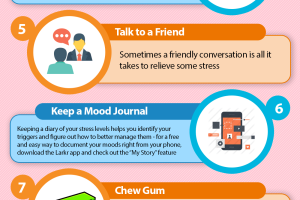Simple Ways to Reduce Stress and Boost Mental Health

Understanding Stress and Mental Health
In today’s fast-paced world, stress has become an inevitable part of life. From juggling work responsibilities to managing personal relationships, it’s no surprise that many individuals find themselves overwhelmed. Stress can be categorized as both positive and negative; the key difference lies in how it affects mental health. Positive stress, or eustress, can motivate and enhance productivity. However, when stress turns into a persistent companion, it morphs into distress, which can significantly impact mental well-being. To truly grasp the relationship between stress and mental health, consider the following:
- Simple Ways to Reduce Stress and Boost Mental Health
- Understanding Stress and Mental Health
- Importance of Managing Stress
- Impact of Stress on Mental Health
- Healthy Lifestyle Habits
- Importance of Exercise
- Benefits of Healthy Eating
- Mindfulness and Relaxation Techniques
- Practice of Meditation
- Benefits of Deep Breathing Exercises
- Social Support and Connection
- Building Strong Relationships
- Seeking Professional Help if Needed
- Common Sources of Stress:
- Work-related pressures
- Financial concerns
- Family dynamics
- Life transitions (e.g., moving, job changes)
- Physical Symptoms of Stress:
- Headaches
- Muscle tension
- Fatigue
- Sleep disturbances
For example, Sarah, a young professional, found herself constantly racing against deadlines, leading to sleepless nights and anxiety. She often felt the weight of the world on her shoulders, which began to affect her productivity and relationships. It was only after she took a step back to analyze her stressors that she could proactively address her mental health needs. Stress doesn’t merely exist in isolation; it impacts various aspects of life. Studies have shown that prolonged exposure to stress can lead to conditions such as anxiety disorders and depression. That’s why understanding stress is essential for mental health maintenance. Identifying stress triggers provides insight into one’s emotional state, enabling individuals to seek effective coping mechanisms. In the upcoming sections, we’ll explore practical strategies to manage stress and enhance mental health effectively. From healthy lifestyle habits to the value of social support, these insights will empower readers to take control of their mental well-being.
Importance of Managing Stress
Impact of Stress on Mental Health
Continuing from the previous discussion on stress and its impact on mental health, it’s essential to recognize that effectively managing stress is not merely a luxury; it’s a necessity. The consequences of unchecked stress can ripple through various aspects of life, leaving lasting effects on mental health. When stress becomes a regular part of life, it can lead to:
- Anxiety Disorders: Persistent stress can manifest in feelings of apprehension, worry, and nervousness, paving the way for chronic anxiety.
- Depression: A constant sense of being overwhelmed can drain energy levels and motivation, leading to depressive symptoms.
- Burnout: Prolonged exposure to stress, particularly in the workplace, can cause emotional and physical exhaustion, affecting performance and satisfaction.
Take the story of Tom, an elementary school teacher. Over the school year, he became increasingly stressed due to demands from both his superiors and his students. As his stress levels rose, he started feeling detached, unmotivated, and eventually displayed signs of burnout. It wasn’t until he recognized the impact stress had on his mental health that he sought to change his situation. As Tom’s experience illustrates, managing stress is vital for maintaining mental equilibrium and overall happiness. To emphasize the importance of effective stress management, consider the following points:
- Improved Focus and Productivity: Reducing stress can enhance cognitive functions, enabling clearer thinking and better decision-making.
- Enhanced Resilience: Developing healthy coping mechanisms can allow individuals to better withstand life’s challenges.
- Healthier Relationships: When stress is managed well, individuals are often more present and engaged in their interactions with others, easing tension in personal and professional relationships.
In conclusion, recognizing the impact of stress on mental health is the first step toward fostering a balanced lifestyle. The journey to better stress management is about building awareness and implementing practical strategies that improve quality of life. In the following sections, we will delve into specific lifestyle habits that support effective stress management.
Healthy Lifestyle Habits
Importance of Exercise
As we continue exploring effective strategies for managing stress, one of the most powerful tools at our disposal is exercise. Embracing an active lifestyle has profound benefits for mental health, serving as a natural antidote to stress. When individuals engage in physical activity, their bodies release endorphins—neurotransmitters that promote feelings of happiness and reduce pain perception. These “feel-good” chemicals can help mitigate stress and anxiety. Here’s how exercise benefits mental well-being:
- Boosts Mood: Regular workouts can increase overall feelings of happiness. Even a brisk 30-minute walk can elevate mood levels significantly.
- Enhances Sleep Quality: Physical activity often improves sleep patterns, aiding in better relaxation and recovery.
- Increases Resilience: Regularly overcoming physical challenges builds self-discipline, which can translate into better stress management in everyday life.
For instance, Jack, who started jogging three times a week, noticed that not only did he lose weight, but his anxiety levels decreased, giving him a newfound sense of confidence and balance.
Benefits of Healthy Eating
In addition to exercise, maintaining a balanced diet is crucial for mental health. The food individuals consume can directly influence their mood and stress levels. A diet rich in nutrients supports brain function and emotional well-being. Here are some key benefits of healthy eating:
- Improved Brain Health: Foods rich in Omega-3 fatty acids, such as salmon and walnuts, promote brain health, enhancing cognitive function and reducing stress.
- Stable Blood Sugar Levels: Consuming whole grains and lean proteins helps maintain insulin levels, which in turn stabilizes mood and energy throughout the day.
- Nutrient-Rich Choices: Incorporating a variety of fruits and vegetables provides essential vitamins and minerals that combat stress.
Creating a balanced diet can involve simple practices like meal prepping or planning weekly menus to avoid last-minute unhealthy choices. For example, Emily decided to swap her sugary snacks for fruit and nuts and noticed an immediate difference in her focus and emotional stability. In conclusion, integrating both exercise and healthy eating into daily routines forms a solid foundation for managing stress effectively. These lifestyle habits not only enhance physical health but also contribute significantly to emotional well-being, giving individuals the tools they need to tackle life’s challenges. In the next section, we will explore mindfulness and relaxation techniques that complement these healthy lifestyle choices.
Mindfulness and Relaxation Techniques
Practice of Meditation
Having established the importance of healthy lifestyle habits, it’s time to unfold the transformative power of mindfulness and relaxation techniques. One of the most effective practices in this arena is meditation. While the concept may seem daunting for beginners, meditation can be a simple yet profound way to manage stress and enhance mental clarity. Meditation encourages individuals to focus on the present moment, grounding their thoughts and emotions. Regular practice cultivates a sense of calm, reducing anxiety and promoting overall well-being. Here are some benefits of incorporating meditation into daily life:
- Enhances Focus: A regular meditation practice can improve attention span and cognitive function, leading to increased productivity.
- Promotes Emotional Health: Studies show that meditation can boost self-awareness, helping individuals develop a more positive outlook on life.
- Reduces Stress: The act of meditation has been shown to lower cortisol levels, the hormone primarily associated with stress.
For instance, Lisa, a busy graphic designer, found that dedicating just 10 minutes each morning to meditation helped her approach her day with greater ease and composure. It became her sanctuary of peace before diving into her hectic schedule.
Benefits of Deep Breathing Exercises
In tandem with meditation, deep breathing exercises serve to further strengthen one’s toolkit for stress management. These techniques, often overlooked, can be incredibly impactful in calming the mind and body, especially during stressful moments. Deep breathing works by slowing the heart rate and lowering blood pressure, making it an excellent immediate response to stress. Here’s how deep breathing contributes to better mental health:
- Reduces Tension: Focusing on breath helps release physical tension, allowing the body to relax and recover.
- Enhances Mental Clarity: By oxygenating the brain, deep breathing can sharpen focus and improve cognitive performance.
- Promotes Mindfulness: It encourages individuals to become aware of their thoughts and feelings, fostering a deeper understanding of stress triggers.
For example, Mark, a recent college graduate, found himself overwhelmed during job interviews. He began implementing deep breathing exercises before each interview, noticing that the practice calmed his nerves and allowed him to think more clearly. In conclusion, integrating practices like meditation and deep breathing exercises into daily routines can greatly enhance one’s ability to manage stress and promote overall mental health. These mindfulness techniques not only provide immediate relief but also cultivate long-term resilience against life’s challenges. In the next section, we’ll delve into the importance of social support and connection as essential components of mental wellness.
Social Support and Connection
Building Strong Relationships
Continuing from our exploration of mindfulness and relaxation techniques, it’s vital to consider the role of social support and meaningful connections in managing stress and enhancing mental health. Relationships are not merely a facet of life but a cornerstone for emotional resilience. Building strong relationships can provide individuals with a sense of belonging, security, and comfort in times of need. Why are strong relationships important? Here’s what they offer:
- Emotional Support: Trusted friends and family can provide a listening ear and reassurance during stressful times, helping to alleviate feelings of isolation and anxiety.
- Practical Help: Strong connections often translate into tangible support, whether it’s someone to help with errands, a partner to share responsibilities, or friends to assist during major life changes.
- Increased Joy: Having strong, positive relationships fosters happiness, which can significantly buffer against stress and improve overall well-being.
For instance, Maria, who moved to a new city for work, felt lost and lonely at first. However, by joining community groups and engaging with neighbors, she quickly built a circle of friends. This newfound support system not only eased her homesickness but also provided her with a network to navigate life’s challenges.
Seeking Professional Help if Needed
While nurturing personal relationships is essential, it’s equally important to acknowledge the times when professional help is required. Mental health professionals can offer invaluable support, particularly when stress becomes overwhelming. Recognizing when to seek help can be a pivotal step toward recovery. Here are some indicators that may suggest it’s time to reach out to a professional:
- Persistent Feelings of Sadness or Anxiety: If feelings of despair or worry linger despite trying various coping strategies, consulting a professional can provide guidance.
- Inability to Cope with Daily Life: When stress starts to interfere with work, relationships, or everyday tasks, it may be time to seek external support.
- Physical Symptoms: If stress manifests physically through symptoms like chronic headaches or fatigue, addressing mental health with a professional can be beneficial.
Consider the case of Tom, who, after several months of feeling increasingly stressed and anxious, decided to speak to a therapist. Through this process, he gained valuable insights and strategies that helped him navigate his stressors effectively. In conclusion, fostering strong social connections and recognizing when to seek professional help are critical elements of a well-rounded approach to mental health. These aspects not only enhance emotional resilience but also create a community of support that can significantly ease life’s burdens. In our final section, we will summarize key takeaways and encourage readers to embark on their journey toward better mental wellness.





